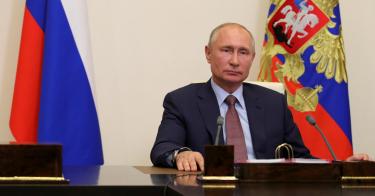U.S. representatives just wrapped up another round of meetings with Russian counterparts to discuss arms control, including the 2010 New Strategic Arms Reduction Treaty (New START), which expires in February 2021.
But while New START looms large, Moscow’s ragged record on international security agreements can leave one concerned about proceeding with renewing, extending, or, even, creating any new pacts with Russia.
And understandably so.
Indeed, the Kremlin’s failure to comply with, and adhere to, a number of international bilateral and multilateral security agreements should be of serious concern, especially when violations are viewed in the aggregate rather than individually.
Russia’s recent non-compliance with no fewer than four major arms control and confidence- and security-building measures (CSBMs) agreements paints a problematic pattern that should worry not only the United States but the international system, too.
For example, in 2019, the United States finally declared the Russian Federation in material breach of the 1987 Intermediate-Range Nuclear Forces (INF) Treaty, a historic Cold War agreement.
Moscow began developing the INF-busting, road-mobile SSC-8 cruise missile (NATO: SCREWDRIVER/Russian: 9M729) as early as 2008. The missile was subsequently flight-tested and then deployed in 2017.
Then there are Moscow’s violations of the Treaty on Open Skies (OST). Going back a decade now, Russia has deliberately and routinely flouted the 30-plus nation aerial observation CSBM agreement.
For example, in 2010, Moscow started preventing OST flights from approaching to within 10 kilometers of Russia’s border with the Georgian regions of South Ossetia and Abkhazia, considering the Russian-occupied territories to be independent states.
The Kremlin also restricts OST flights to 500 kilometers in length over the highly militarized Russian exclave of Kaliningrad, located between NATO members Lithuania and Poland.
Plus, in 2007, Russia suspended participation in the Treaty on Conventional Armed Forces in Europe (CFE), an arms control agreement dating back to the Cold War. Concerns about Moscow’s departure from CFE have been elevated by its unannounced or “snap” military exercises.
Some contend Russian strategic or large-scale military exercises—announced or unannounced—can mask troop and equipment movements, providing cover for aggression. Russian actions in Georgia and Ukraine have understandably raised the alarm.
The United States also considers Russia to be violating the Chemical Weapons Convention for its use of the military-grade nerve agent “novichok” in a 2018 assassination attempt in the United Kingdom of a former GRU officer, among other concerns.
The U.K. attack, using an advanced, highly lethal nerve agent, suggests that Russia may retain an active, undeclared chemical weapons program, which may include development, production, and stockpiles.
It doesn’t end there.
Washington is undoubtedly not alone in its disquiet by Moscow’s non-performance on a number of other international bilateral and multilateral security agreements, too.
These include: the U.S.–Russia Treaty on the Limitation of Underground Nuclear Weapons Tests (aka the Threshold Test Ban Treaty, the Biological Weapons Convention, the Vienna Document, and the Presidential Nuclear Initiatives Concerning Tactical Nuclear Weapons.
In sum, there are plenty of reasons to question Russia’s willingness to meet its obligations in the arms control and CSBM arena.
As such, Washington should proceed with caution, firmly basing any future U.S.–Russian security agreements on American national interests and not merely a desire for engagement. Any agreement must make America more secure.
It should also ensure Russia understands that pact non-performance has consequences. Washington mustn’t allow Russia to violate security agreements with impunity; permitting that would only beget more bad behavior.
Washington should also launch a robust information campaign about Russia and arms control that engages key constituencies, including the Congress, the U.S. public, allies, partners, and friends.
Lastly, it should also push allies, friends, and partners to use their influence to press Russia to comply—or come back into compliance—with existing arms control and CSBM agreements. Many beyond Washington are certainly affected by Russia’s bad behavior.
Unfortunately, the Kremlin views playing by its security pledges as optional, as it moves deliberately to advance its self-perceived national interest as a great power in the global system.
These misguided Russian approaches to international security undermine the goals of stability, predictability, and mutual benefit that these pacts seek to confer on parties through cooperation, coordination, transparency, and understanding.
As such, the United States is right to enter into—and exit from—arms control and other security agreements with Russia based on past, current, and expected future performance.
Indeed, the Trump administration should be lauded for its decision to withdraw from INF and OST due to Russia’s brazen, long-standing violations.
This piece originally appeared in The National Interest https://nationalinterest.org/feature/can-russia-be-trusted-international-security-pacts-167294



